Dr Francis Hessey Anderson
Written and researched by David
Bohl,
with the kind help and documents supplied by World War 1 historians
worldwide.
Played 1913-14
Francis Hessey Anderson was born on the 29th
November 1894, the son of Harry Anderson of Richmond, Natal, South
Africa and attended Hilton College, Natal. He started
his Medical Degree at Manchester University in 1912 where he excelled
in both rugby and cricket, gaining his colours in the 1912-13
season.
In the 1913-14 Winter Sports Supplement of the Manchester University
Magazine he is described as follows “ The most determined of
the
defensive halves: invaluable in saving and tackling, and keen almost to
a fault, Much improved in passing out, and appreciates the value of the
blind side of the scrum. Played for Lancashire throughout the
season”.
There seemed to a close connection between the medical fraternity of
the Aliens and their Manchester colleagues with South African stars
such as Von Mengerhausen and Anderson playing frequent games in the
1913-14 Season.
[Many thanks to Dr James Peters, Archivist at Manchester University Archive & Records Centre]
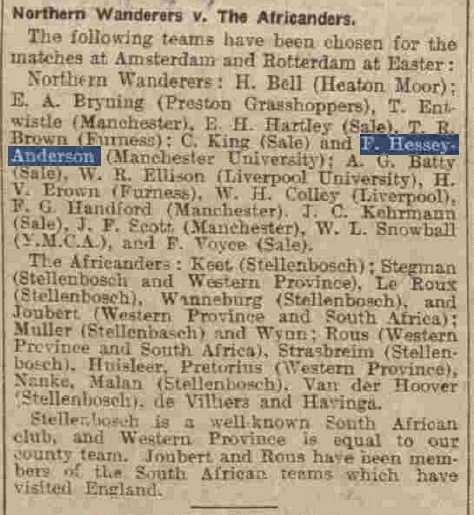
4th Feb 1913
The Aliens broke the spell
which has remained so long on their
homeland at Clubmoor by a brilliant 25 points to 3 victory. Southport
were weakly represented, their team including eight reserves, Twy being
absent from the pack, and Gifford much missed at half-back. Aliens
opposed them with an exceptionally strong combination, which included Hessey-Anderson,
the Lancashire half-back, and Von Mengershausen, Manchester University
and ex-South Africa three-quarter. Aliens asserted themselves early, as
after three minutes H. Anderson obtained from a five yards' scrum, and
eluding Grimshaw, Wainwright and Mackintosh "docked" safely. Later
Anderson's astuteness enabled Ellis to slip through unmolested. After
dominating the scrum the Aliens heeled out to Anderson, who artfully
enabled the veteran Croston to get in near the posts, Bishop later
cleverly negotiating the major points. Following a line out, Trist also
traversed the Southport lines. Von Mengershausen engineered a bright
venture, and parted to Croxford, who worked the oracle once more.
Aliens thus had 19 points to their credit at the interval.
Olympic resumed with the wind in their favour, and soon managed to
catch their hosts napping. Following a five yards' scrummage Grimshaw
got away with oval to Baldwin, who got home smartly, and thus scored
Southport's solitary try. The homesters, however, continued to
dominate, and further tries came from Anderson and O'Donnell. The
outstanding feature of the game was Anderson's irrepressibility.
Post 4/1/1914
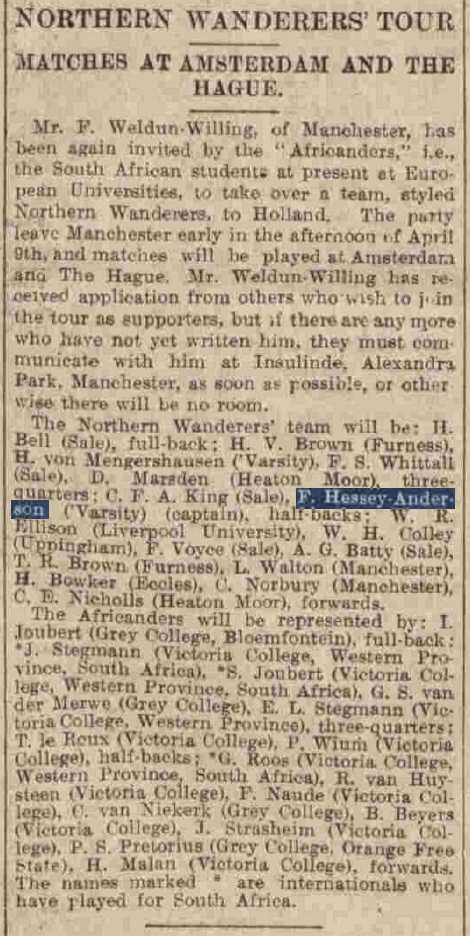
3rd Mar 1914
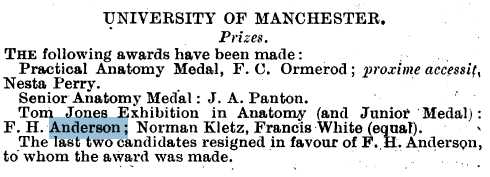
British Medical Journal 14/2/1914
He joined the Royal Naval Volunteer Reserve and in June 1915 was appointed Surgeon Probationer(like a GP) aboard the destroyer HMS Legion.
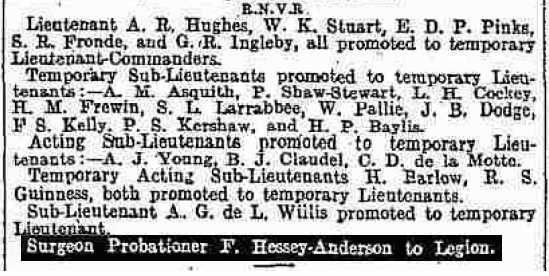
3rd July 1915

Book 1979
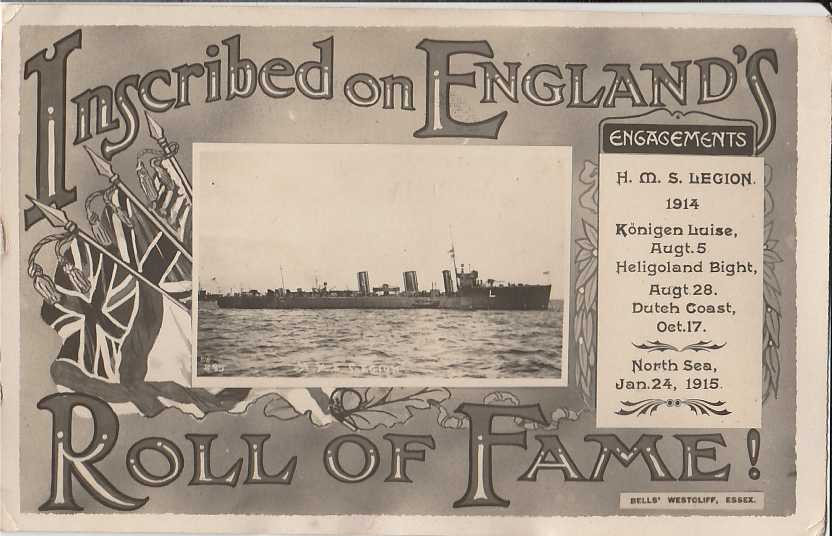
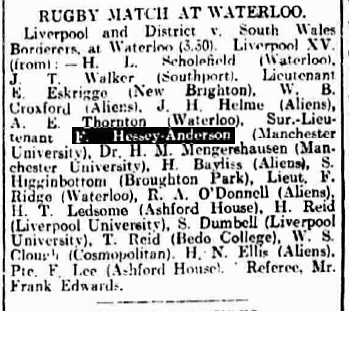
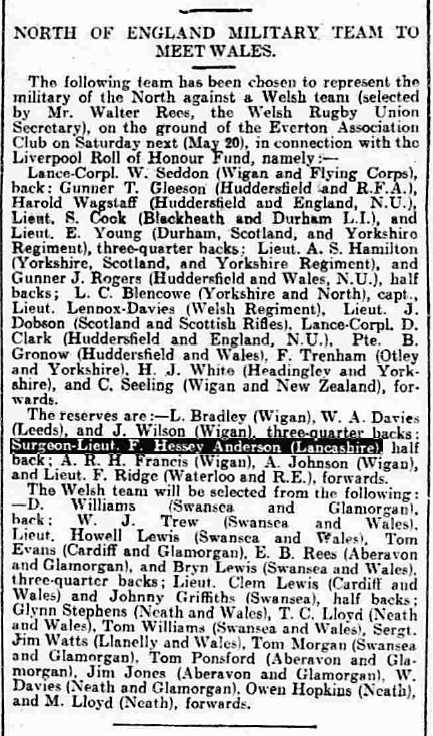
13th May 1916

[ancestry.com]
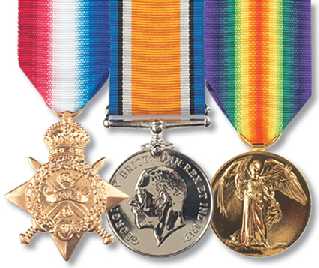
After a break for war service
he graduated with his medical degree
in 1920 and returned to South Africa to continue his career and
sporting prowess.
Dr. F. H. Anderson, ex-captain
of Manchester University and
Lancashire County Rugby XV., has lost very little time in making his
mark in African Rugby football circles. Soon after his return to that
country he led his club, the Wasps Wanderers of Pietermaritzburg, to
victory in final of the Murray Cup; and the Blue Riband of Natal Rugby.
That was on September 24, 1921, the last Saturday of that season.
On May 6 Dr. Anderson played in a Natal trial match for the Rest of
Natal v. Combined Durban. Durban won by 18 points to 12 (thanks to
superior kicking), but so greatly did the Doctor impress that he was
not merely selected to partner W.H.Townsend, the Springbok half-back,
but he was actually, on his first selection for Natal, appointed
captain of the team in succession to H. W. Taylor, the South African
cricket captain, who has now retired from active participation in Rugby
football.
The distinction which has accorded Dr. Anderson will be understood
better when it is explained that the Natal team selected contains no
fewer than five members of the South African side which visited New
Zealand last year and of those five one is a former captain.
The Natal team was due to sail from Durban on May 19 for the purpose of
playing three Currie Cup matches in the Cape Province, their opponents
being the Border, the Eastern Province, and. the Western Province.
To play these three matches the team will have to travel over 2,400
miles, and will be away from Natal 13 days.
Athletic News 1922
According to the South African Medical Journal in 1924 Dr
Anderson had branched into Gyneacology and was Secretary of this
section.
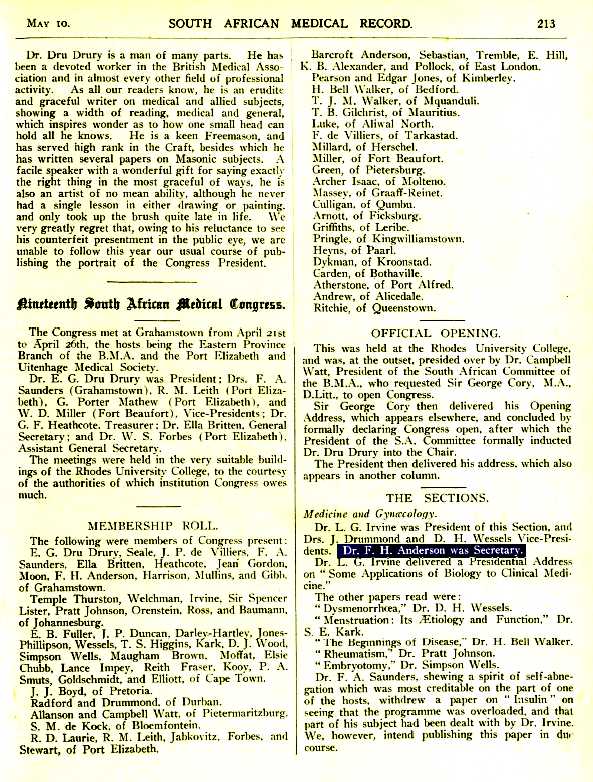
A request to the Secretary of Collegians Rugby Club, Willie J. Field in Pietermarizburg for information on his later life has disappointingly revealed nothing.
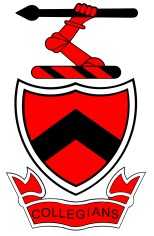
Dr F.H.Anderson M.B. Ch.B.